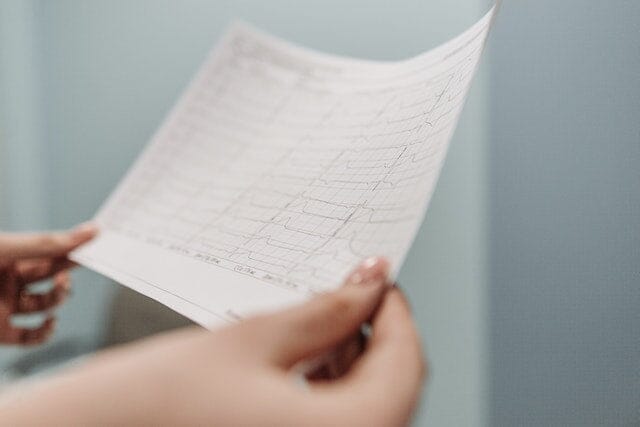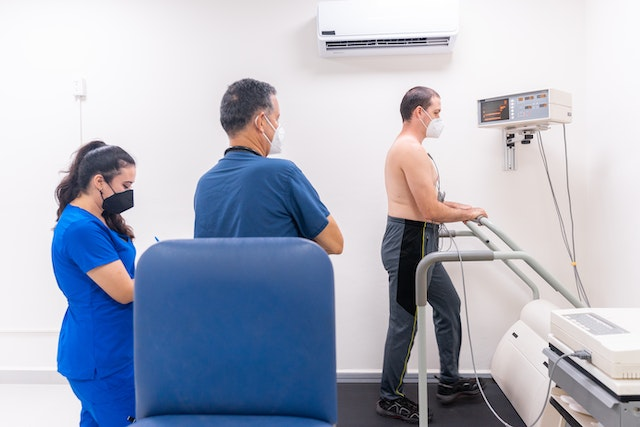
Understanding How ECG Test Is Done For Cardiac Patients
Time to read 3 min
Time to read 3 min
An ECG or an electrocardiogram is a scientific way of measuring the signals of your heart. The test is designed to inform your doctor about potential cardiac issues through the analysis of the heart beat.
If you are experiencing the symptoms of cardiac issues, such as palpitations, lack of circulation in chest arms and legs, and rapid heart beat, then getting an ECG done is the best way to find the underlying cause.
It's also important to know how ECG test is done so that you're prepared for the examination. You have more information about what aspects are being tested and have greater understanding of the report.
An electrocardiogram ECG is a simple non-invasive test to measure the heart's activity. Your heart's electrical activity can be captured using the EKG machine which can check for blockages, arrhythmia, and aberrations in heart rate.
There are three types of ECG tests that can be performed for patients, namely -
1) At rest ECG
2) Stress ECG
3) Ambulance ECG
Depending on the type of situation and symptoms experienced by the individual, the appropriate ECG will be provided.
Your risk of heart attacks can be checked with an ECG reading. Your doctor can have more information on your cardiac risk with the right ECG report. You should also get an ECG done regularly if you are a higher risk factor.
The ECG can uncover the electrical activity of the heart, to help cardiologists to understand potential aberrations and issues with activity. When you are experiencing the chief cardiac symptoms, you need an ECG to determine the root cause.
Irregular heart beats or rapid or slow beating can be diagnosed using an ECG. This should be a part of an annual examination if you have a history of cardiac issues.
Inflammation in the heart can be checked using an ECG machine. This is a critical tool to help doctors identify the risk of heart disease or injury, which would require further assessment and treatment.
If you are experiencing chest pains, then using an ECG machine can help in identifying the root cause of the issues. You can map out key symptoms to the results of the ECG reading, and your doctor can provide the right medication and treatment.
If your pacemaker is not functioning effectively, then you may find that your heart rate is abnormal. This can be detected scientifically with an ECG reading, after which your cardiologist will provide the next strategic steps.
You should be mindful of the following symptoms when you are at a higher risk of developing cardiac disease or heart issues.
A shooting pain in the chest and heart region shouldn't be ignored. You should get checked up immediately.
You can have a sudden feeling of palpitations, which can last for several seconds. You should get a test done to determine the root cause.
There may be cases where you have a sudden spike in heart rate activity, which may prevent you from breathing clearly.
If you experience dizziness and headaches multiple times a day, then getting your heart tested is an important step.
Chronic fatigue and longer recovery periods can be signs of heart issues.
If you find that you are fainting multiple times, then getting an ECG is important.
It's important to inform your doctor about your medical history, any medications, and other important information. There are no special instructions that you need to follow for the ECG test.
The electrodes are attached to the skin, giving the machine the accurate reading of the heart beat. Any potential aberrations can be identified with the ECG reading, which can help doctors perform secondary analysis.
Your reading is printed out and you can get a complete analysis done on the spot. You can also share your report with your doctor, who can track your symptoms better.
You can receive your report directly, and have the electrical activity of the heart charted out in the form of a graph.
Based on your symptom profile, your doctor may recommend getting other tests done as a part of the total health checkup. An X-ray, MRI, ultrasound, and blood test may be recommended in the event that your doctor requires more medical information.
* Medical Disclaimer - The following information is for educational purposes only. No information provided on this website, including text, graphic, and images, are intended as substitutes for professional medical advice. Please consult with your doctor about specific medical advice pertaining to your condition(s).
